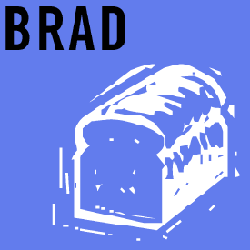 | |
| { I Am the Bread } Brad Siemens graphic by Beth Sullivan
Sai — said with potent anger, complete with wrinkled nose; just a few emotional degrees away from spitting Sai Zhi Yuan. It means something along the lines of Strong Mr. Gold. Unfortunately, it hasn't helped my pocketbook over the years, but you can't blame them for trying. Gaew — said in the most utterly gay manner possible, as if mimicking the arc of a flirtatious, dismissive flip of the wrist Gaew Samark Samboon. Crystal of Infinite Ability. I kid you not. Clearly, that's a name I lived up to forever. | |
 There is a strange balance in a wedding ceremony between claiming the life ahead, expressing identity as a couple, and trying not to offend, confuse, or otherwise maim relations with family and friends. To ease some of this tension, my wife and I married in Kenya, traveling there with only a small entourage of my immediate family (the Siemens clan) and Andrea's immediate family (the Martin clan). Still, our way of framing our life commitment was not met exclusively with balmy familial understanding.
There is a strange balance in a wedding ceremony between claiming the life ahead, expressing identity as a couple, and trying not to offend, confuse, or otherwise maim relations with family and friends. To ease some of this tension, my wife and I married in Kenya, traveling there with only a small entourage of my immediate family (the Siemens clan) and Andrea's immediate family (the Martin clan). Still, our way of framing our life commitment was not met exclusively with balmy familial understanding.